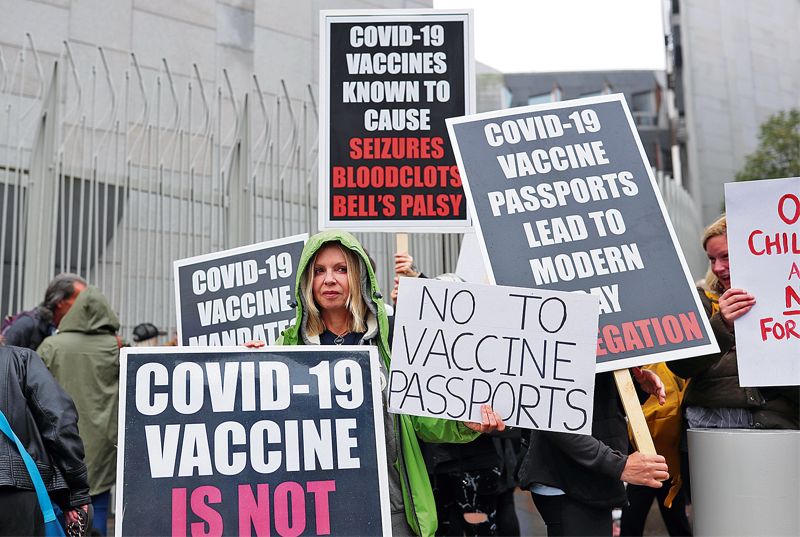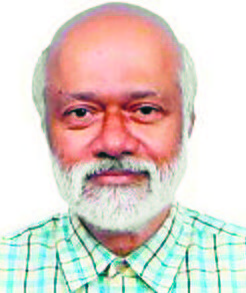
SCOPE: India’s decision to end reciprocal curbs will benefit only the diaspora. Reuters
KP Nayar
Strategic Analyst
RECIPROCITY in the Covid-19 vaccine context, as India discovered during a week of its application on all United Kingdom nationals arriving in India, is a double-edged sword. After India imposed tit-for-tat restrictions on October 4 on British citizens on account of non-recognition of Indian vaccination certificates by the UK, the sole victims of New Delhi’s reciprocal action have been Persons of Indian Origin (PIOs).
Because arrival restrictions such as mandatory quarantine applied only to the UK nationals, the collateral victims of New Delhi’s decision — although justified on principles of diplomacy — have been mostly Sikhs and other Punjabis among these arrivals. They account for the majority of travellers from London and Birmingham, the main points of direct flight departures to India from Britain.
India stopped issuing tourist visas to foreign passport-holders a year and a half ago. Since March last year, there have been no regular, scheduled commercial flights into India. The only planes that flew in were evacuation flights for Indians abroad, known as Vande Bharat, and subsequently, those under air bubble arrangements for the movement of passengers as a temporary measure pending the resumption of scheduled flights.
Barring rare exceptions permitted under the rules, the only UK passport-holders using either of these modes of air transport into India have been PIOs who are Overseas Citizens of India (OCI). White or black people from Britain or other Asian origin UK nationals, such as non-Indian migrants from Hong Kong have not been travelling to India from London or Birmingham since the first quarter of last year.
Nor are they likely to be in any hurry to visit India even though they can get tourist visas from October 15 if they agree to hop on a chartered flight for sight-seeing, spiritual exhilaration or rest and relaxation. If the pandemic situation continues to improve throughout this country, British nationals other than OCIs will trickle back to India from November 15, when they can get tourist visas to fly on bubble flights to start with and later on scheduled commercial flights as and when they resume in a phased manner.
Therefore, it is the ethnic Indian diaspora which will benefit from New Delhi’s decision to end reciprocal restrictions on the UK passport holders following Britain’s belated move to recognise Indian vaccination certificates issued to those who have been immunised by the Covishield vaccine. Supranationalist Indians have been accusing the UK of vaccine racism in non-recognition of Covishield, which is actually a formulation of the Oxford/AstraZeneca vaccine, but produced in India.
Yet, the sad reality is that when India protested, New Delhi’s reciprocal actions were like water off the duck’s back for the white and black Britons on the street who did not care less. The only reason why British politicians took less than a week after India’s reciprocal measures to have a fresh look at charges of vaccine racism was that the mainly Punjabi — but also other Indian origin — vote bank across the UK was upset that their people travelling to India were being forced into quarantine in Delhi and Amritsar on arrival because of political insensitivity in the Whitehall. Besides, talks on resolving this issue were already at an advanced stage when reciprocity by India kicked in.
In his earlier avatar as Ambassador, S Jaishankar, the External Affairs Minister, was the grandmaster of using reciprocity as a diplomatic tool to protect and promote India’s interests. When the Americans arbitrarily arrested and strip-searched Devyani Khobragade, then India’s Deputy Consul General in New York City, in December 2013, Jaishankar was rushed to the US prematurely to assume charge as Ambassador and deal with what snowballed into the biggest crisis in Indo-US relations in recent years.
When the Barack Obama administration threw decency in state-to-state relations out of the window, Jaishankar, along with Taranjit Singh Sandhu, his Deputy Chief of Mission and a veteran in dealing with the US, recommended to New Delhi sweeping reciprocal measures on the Americans. These included several actions which crippled the American School in Chanakyapuri, the Capital’s diplomatic enclave, withdrew the diplomatic immunity of Khobragade’s counterparts at US Consulates in four Indian metros and effectively closed their recreation and shopping facilities at the embassy in New Delhi. New York’s Indian-origin prosecutor had to let Khobragade go scot-free as was her right as a diplomat with immunity under treaty obligations.
Throughout the Indo-US nuclear negotiations, when he was the main Indian negotiator, Jaishankar insisted on reciprocity at every stage. In 2014, when captains of American industry were demanding unilateral concessions from India with a sense of entitlement, Jaishankar told them off pointing to the imperatives of reciprocity. This was the only time Indians turned the tables on the Americans in commercial negotiations.
What last week’s reciprocal actions imposed on the UK showed, however, was that while reciprocity works in matters that are solely government-to-government, India is severely handicapped when it comes to steps which involve people. The huge Indian diaspora spread across the globe, from Aruba to Australia and from Fiji to Finland, ties India’s hands. Actions like the mandatory quarantine on British nationals affect PIOs much more than foreign nationals who are not of Indian descent.
Last year, after India imposed a complete lockdown with no notice to contain the pandemic, there were 38,000 Canadian citizens who registered with the authorities for repatriation to their country. 38,000 Canadians stuck in India? It was a jaw-dropping figure. It turned out that 90 per cent of them were Indo-Canadians, the majority from Punjab. The shutdown of Indian civil aviation did not significantly affect the white Canadians or those of other races, but mainly OCIs.
It did not help that Sushma Swaraj, the External Affairs Minister in the first five years of the Narendra Modi government, made the welfare of OCIs and non-resident Indians (NRIs) the primary mission of the Ministry of External Affairs (MEA). So much so, Indian consular officials across the world were saying the MEA had become one of the biggest service delivery organisations in the world. The recent experience of imposing reciprocity on the UK in people-to-people matters is a good occasion to take a fresh look at how to make Indian diplomacy less vulnerable to the needs and demands of its diaspora.
Join Whatsapp Channel of The Tribune for latest updates.




























